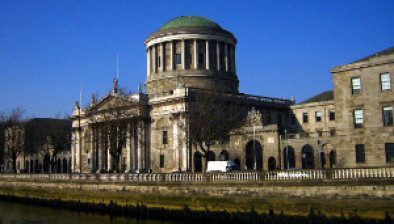High Court: Men challenging extradition to Northern Ireland refused discovery of evidence gathered by gardaí
Two men challenging their surrender to Northern Ireland to face trial for the attempted murder of two PSNI officers have had their applications for discovery of evidence gathered by gardaí dismissed in the High Court.

About this case:
- Citation:[2019] IEHC 805
- Judgment:
- Court:High Court
- Judge:Mr Justice Donald Binchy
Describing the applications as a fishing expedition, Mr Justice Donald Binchy said that a “mere assertion of the most general kind that a right or rights will be violated is not enough” to establish that discovery is reasonable and necessary.
Background
In June 2015, Sean McVeigh was witnessed attaching an improvised explosive device under a car in the driveway of a house belonging to two PSNI officers in Eglinton, Co Derry. Mr McVeigh escaped in a Volkswagen Passat when one of the officers saw him crouched down beside the car and hammered on the window. The PSNI followed the Passat and another car involved in the attack to the Derry-Donegal border, after which the Gardaí gave chase. Mr McVeigh and the applicants in the present proceedings, Ciaran Maguire and Sean Paul Farrell, were arrested in the Passat by Gardaí outside Killygordon, Co Donegal.
In Belfast Crown Court in March 2019, Mr McVeigh was sentenced to 25 years for the attempted murder of two police officers, together with a concurrent sentence of 20 years for possession of explosives with intent to endanger life.
European Arrest Warrants
Pursuant to European Arrest Warrants issued by Belfast Magistrates’ Court in March 2017, the Minister for Justice & Equality sought orders for the surrender of Mr Maguire and Mr Farrell.
Mr Maguire pleaded that his surrender was expressly prohibited, inter alia, by s. 37 of the European Arrest Warrant Act 2003 as any such surrender would be in breach of his constitutional rights and/or would be in breach of his rights as enshrined in the ECHR and by the ECHR Act 2003.
Mr Farrell pleaded that his surrender should be refused pursuant to s. 37 of the European Arrest Warrant Act 2003, alleging that the conditions prevailing at the prison in Northern Ireland where he would likely be committed to would be in breach of his human and constitutional rights to health and human dignity, and that he would be subjected to inhuman or degrading treatment at that institution.
Applications for discovery
This judgment concerns applications for discovery, in which Mr Farrell and Mr Maguire sought orders directing the discovery details of:
- Samples taken or items seized following the June 2015 arrest;
- Statements made or taken in the course of the investigation;
- Memoranda of interview;
- Audio-visual recordings made in the course of detention.
On behalf of Mr Farrell, it was stated that such discovery was necessary to establish that if surrendered to NI, adverse inferences would be drawn from contents of the interviews and from his exercise of his right to silence at interview, at trial, or both.
On behalf of Mr Maguire, it was submitted that if evidence adduced at trial in NI “was procured by Gardaí in breach of his constitutional rights his surrender is statutorily prohibited” and that because he would not be able to successfully raise constitutional violations at trial in NI, it was “imperative” for him to have the opportunity to defend and vindicate his rights in this jurisdiction.
No allegation of rights violation
Mr Justice Binchy said it was striking that “no allegation of any kind had been made that the evidence gathered by the Gardaí from the respondents was gathered in violation of their constitutional rights”.
In this regard, Mr Justice Binchy said he appreciated that it was “more difficult to do this without sight of the evidence”, but that one of the respondents had a solicitor at interview, and further, there was nothing to suggest that either respondent suffered from incapacity inhibiting them from instructing their solicitors about anything that happened during interview or any other time.
Mr Justice Binchy said it was unrealistic to expect that if such instructions disclosed any violation of their constitutional rights, such violation would have been relied upon to support the applications.
Right to a fair trial in Northern Ireland
The second striking feature was that, aside from the point about adverse inferences drawn from silence, it had not been argued that the respondents would not obtain a fair trial in NI.
Although it was correct that the respondents would be unable to rely on Bunreacht Na hÉireann at that trial, Mr Justice Binchy said it was “significant” that they did not argue that the rights they would be entitled to in NI were “any less than those guaranteed to them by Bunreacht na hÉireann, in particular as regards the gathering and admissibility of evidence”. Furthermore, it was not suggested that they would not be entitled to the materials sought if surrendered to NI.
The respondents said the particulars of alleged rights violations had not been pleaded because they did not have the opportunity to examine the evidence, and argued that they were in a “chicken and egg situation”. However, Mr Justice Binchy did not accept this, and said this argument could be advanced the requirement to link materials sought to the issues raised in pleadings in any discovery application.
Fishing expedition
To establish discover is reasonable and necessary for a determination of the substantive hearing, Mr Justice Binchy said that a “mere assertion of the most general kind that a right or rights will be violated is not enough”.
Explaining that something more specific was required, Mr Justice Binchy described the present case as a fishing expedition.
Mr Justice Binchy said that to grant the applications “would be to treat differently applications for surrender where the evidence, or some of the evidence relied upon by the prosecuting authorities in the requesting State has been gathered in this jurisdiction, and applications for surrender where none of the evidence has been gathered in this State”.
Commenting that this could not be correct, Mr Justice Binchy said the “mere coincidence that evidence has been gathered in this State can hardly of itself constitute a ground for ordering discovery of that evidence any more than the Court would be entitled to make a request of the requesting State to see the evidence relied upon by the Prosecutor in that State, and to consider the circumstances in which that evidence was obtained, prior to making a decision on surrender”.
Emphasising the need for applicants to “provide a link between the factual background, the pleadings and the right allegedly violated”, Mr Justice Binchy dismissed the applications.










